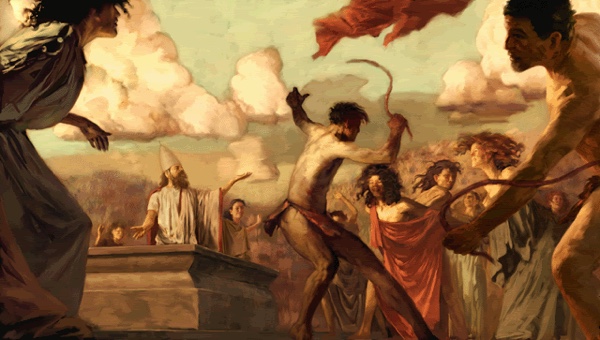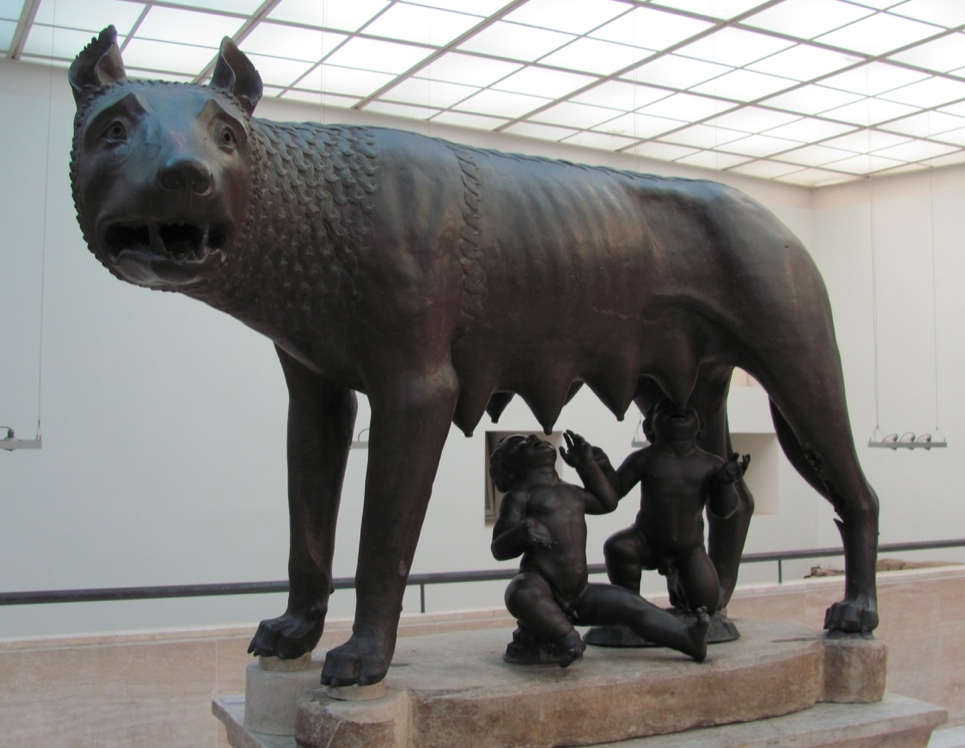 In AD 495, Christian bishop of Rome, Gelasius, finally managed to suppress the more than thousand year old Roman festival of Lupercalia. Gelasius’ letter to senator Andromachus taunted the nominally Christian senators who were intent on preserving the Roman tradition: “If you assert that this rite has salutary force, celebrate it yourselves in the ancestral fashion; run nude yourselves that you may properly carry out the mockery.” That would have been something to see!
In AD 495, Christian bishop of Rome, Gelasius, finally managed to suppress the more than thousand year old Roman festival of Lupercalia. Gelasius’ letter to senator Andromachus taunted the nominally Christian senators who were intent on preserving the Roman tradition: “If you assert that this rite has salutary force, celebrate it yourselves in the ancestral fashion; run nude yourselves that you may properly carry out the mockery.” That would have been something to see!
So, two questions: What was the Lupercalia? And why was a pagan festival still celebrated a hundred years after emperor Theodosius had banned all manifestations of pagan religion on pain of death in his last edict in AD 395. (The same edict that had triggered the exodus of pagan Romans northwards to found Roma Nova…)
Superficially, Lupercalia looks like a mob of scantily clad young men of rank, running around the posh part of the city, full of sauce and whipping people, especially young women – sounds very student-like… But this was a quintessential Roman rite and significant on many levels to Romans for a thousand years.
The name Lupercalia was believed in antiquity to be linked with the Ancient Greek festival of the Arcadian Lykaia (from Ancient Greek: λύκος – lukos, “wolf”, Latin lupus). In Roman mythology, Lupercus is the god of shepherds. His festival was celebrated on the anniversary of the founding of his temple on 15 February near the cave of Lupercal on the Palatine Hill where, according to Rome’s founding myth, Romulus and Remus were suckled by a she-wolf, or lupa.
The rites were directed by the Luperci, the ‘brothers of the wolf’, a corporation of sacerdotes (priests) of Faunus, usually of equestrian ran, who were dressed only in goatskins. After the sacrifice by the Luperci (or the flamen dialis – a leading priest) of two male goats and a dog, Luperci were led to the altar and anointed on their foreheads with the sacrificial blood, which was wiped off the bloody knife with wool soaked in milk, after which they were expected to smile and laugh. (Nice)
Sacrificial feasting (and obviously drinking) followed, after which the Luperci cut thongs from the skins of the animals (februa), then ran round the walls of the old Palatine city with said thongs in their hands. As then ran, in two bands, they struck people who crowded near. Girls and young women would line up on their route to receive lashes from these whips. The theory went that this encouraged fertility, prevented sterility in women and eased the pains of childbirth.
So why did this rite persist into the fifth century? Even though the festival had deteriorated and was no longer organised by patrician young men but left to the rabble to run, Romans still claimed it was such an ancient part of their lore, their history, that it was vital for the safety and prosperity of Rome that it should continue. A strong claim that came from Roman hearts, it was said. Perhaps it was a sense of clinging on to the memory of a past when Rome was a world power rather than a diminished city, one of many in Italy. Perhaps it was a chance for rebellious young men to let off steam.
Although fiercely contested, Gelasius did eventually suppress Lupercalia. Significantly, this festival of fertility and purification with violent overtones, which had given its name — dies februatus, from februare, to purify — to the month of February, was replaced with a Christian festival celebrating the purification after childbirth (a perfectly normal, natural function) of the soft and compliant Virgin Mary instead – Candlemas, observed forty days after Christmas, on 2 February, a little earlier in the month. Those with a sense of the ironic may let a little smile cross their lips.
Oh, and fierce, pagan Lupercalia has no connection with Valentine’s Day.
Alison Morton is the author of Roma Nova thrillers – INCEPTIO, CARINA (novella), PERFIDITAS, SUCCESSIO, AURELIA, NEXUS (novella), INSURRECTIO and RETALIO, and ROMA NOVA EXTRA, a collection of short stories. Audiobooks are available for four of the series. Double Identity, a contemporary conspiracy, starts a new series of thrillers. Double Pursuit, the sequel, is now out!
Download ‘Welcome to Alison Morton’s Thriller Worlds’, a FREE eBook, as a thank you gift when you sign up to Alison’s monthly email newsletter. You’ll also be among the first to know about news and book progress before everybody else, and take part in giveaways.













